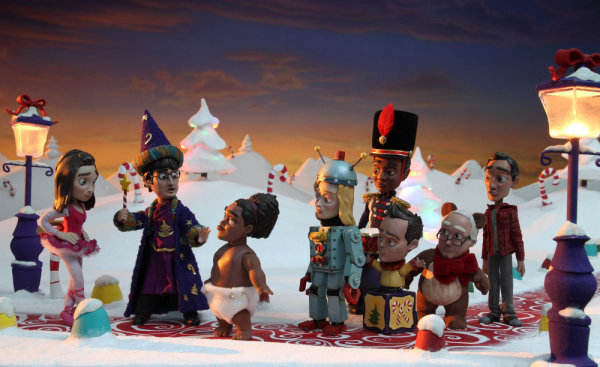What Makes a Good Moral?
I’ve had a strangely consistent record with this season’s Community of liking “little” episodes (like last week’s, which I thought was terrific) better than the “big” ones. I thought the bottle episode — which was not big in budgetary terms, but was huge in terms of self-proclaimed ambition — started out brilliantly and then got a bit heavy and didactic in the second half. And my reaction to last night’s stop-motion Christmas special was similar: of course I admired the ambition of it, but I found the second half rather heavy-handed and on-the-nose in the way it told us, repeatedly, what the moral of the story was.
Share
 I’ve had a strangely consistent record with this season’s Community of liking “little” episodes (like last week’s, which I thought was terrific) better than the “big” ones. I thought the bottle episode — which was not big in budgetary terms, but was huge in terms of self-proclaimed ambition — started out brilliantly and then got a bit heavy and didactic in the second half. And my reaction to last night’s stop-motion Christmas special was similar: of course I admired the ambition of it, but I found the second half rather heavy-handed and on-the-nose in the way it told us, repeatedly, what the moral of the story was.
I’ve had a strangely consistent record with this season’s Community of liking “little” episodes (like last week’s, which I thought was terrific) better than the “big” ones. I thought the bottle episode — which was not big in budgetary terms, but was huge in terms of self-proclaimed ambition — started out brilliantly and then got a bit heavy and didactic in the second half. And my reaction to last night’s stop-motion Christmas special was similar: of course I admired the ambition of it, but I found the second half rather heavy-handed and on-the-nose in the way it told us, repeatedly, what the moral of the story was.
It may be that moralizing is just part and parcel of this kind of Christmas episode, and after all, it was tougher for them to show rather than tell because they were working in an unfamiliar medium. But what happened in the last scene is not all that different from what the show has done in other episodes. Community and Big Bang Theory are two completely different kinds of shows, but both have this inclination toward having characters openly articulate what the theme of the episode is supposed to be. The former show errs on the side of having too much of a lesson and the second errs on the side of having no lesson at all, but both of them are going to have their characters sit down and tell each other what the story is about, rather than unconsciously showing it through their actions.
With Community, the ability of characters to analyze their own situations is part of the way the show is set up, so I don’t necessarily consider that a flaw. (If every character had equal ability to tell us what the story was about, that would be a flaw. But there’s a sliding scale of self-awareness — starting with Abed, who almost always knows what the episode is about — and the characters are in part defined by how self-aware they are about the story and its moral.) But in some episodes I feel like the show isn’t earning the emotional payoff it clearly wants to have, because it tries to earn it through talking — about the problem, about the epiphany, about the theme. Again, that may be just part of the style of the show, which is about analyzing pop culture and its effect on the way we think about life, and where many characters analyze their lives in the way we analyze pop culture online. But I think when it does earn the payoff it’s because it does so more through something that happens on screen. Last week’s unusually serious episode worked very well for me because much of the moral was conveyed by the things people did and Troy’s unspoken reactions to them.